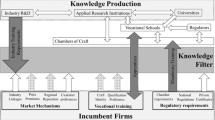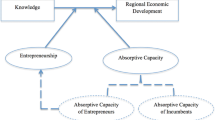Abstract
The knowledge spillover theory of entrepreneurship (KSTE) considers determinants of knowledge diffusion as well as their impact on entrepreneurial activities and growth. Extending the KSTE, the role of incumbent firms for the broad diffusion of new knowledge has been emphasized. For those firms, the barriers to an effective flow of information are considered using the concepts of knowledge filters and absorptive capacities. Both concepts enable the derivation of institutional measures to penetrate knowledge filters and systematically increase absorptive capacities. We interpret the process of digitization as a central process of knowledge spillover in recent years and determine digitization-related knowledge filters for particular domains of firm decision-making. Using a consultant-based in-depth evaluation of 200 small and medium-sized enterprises (SMEs) conducted in the context of a federal innovation program, structural drivers, firm clusters, and domain-specific knowledge filters for digitization are determined. We find little evidence for structural drivers of knowledge spillover effectiveness. However, as firms are clustered according to their digitization pattern, we show that firms realize high degrees of digitization in most domains or in none, leading us to argue that domain-specific knowledge filters are weak. Rather, knowledge spillover in digitization can be considered a process with initially strong general knowledge filter and—once this filter has been penetrated—weaker subsequent domain-specific knowledge filters. Policy and managerial implications for increasing digitization-related knowledge spillovers in SMEs are discussed.
Similar content being viewed by others
Notes
While numerous definitions of digitization exist, following Loebbecke and Picot (2015), we denote digitization as the broad transformation process of an economy through digital technologies. This process has effects on all societal groups; within firms, it primarily refers to the use of new technologies such as big data analytics, machine learning, automation, a transformation of communication structures with customers, and other businesses. However, it refers not only to the use of novel technologies per se, but also encompasses the various changes on workplaces, intra-firm processes and firm structures fostered by technological change.
Examples for determinants of knowledge filters range from geographical characteristics of a particular region (Acs et al. 2009a; Acs and Plummer 2005), the effectiveness of national institutions (Stenholm et al. 2013; Proeger 2018), the age of firms (Acs et al. 2009b; Carlsson et al. 2009), asymmetric information (Feser & Proeger, 2017; Proeger & Rupieper, 2019 ) or social norms (Guerrero and Urbano 2014).
The online version can be accessed via www.bedarfsanalyse-handwerk.de.
The question regards the regulation of craft businesses in Germany, of which the sample mainly consists. There are two regulatory classes (“A”- and “B-Gewerke”) which are primarily differentiated by the required occupation licensing for opening up a business. In the A-sector, a further qualification title is required to run a business, while in the B-Sectors, there are no entry requirements. For the analysis of digitization patterns, this differentiation should not play a substantial role and is therefore dropped from the analysis.
Along with industrial SMEs, the German craft sector is considered the backbone of the German model of production of highly specialized SMEs with a high knowledge intensity and innovativeness. The sector yields an annual revenue of about 581 bn euros, features a share of 12% of all employees, 28% of all apprentices within the dual training system, and 1 mio firms overall (for all current numbers, see information by the German Confederation of Skilled Crafts (ZDH) on https://www.zdh.de/daten-fakten/kennzahlen-des-handwerks-2016/). Therefore, it can be considered a representative economic sector for conducting research on the structure of SMEs.
References
Acs, Z. J., & Plummer, L. A. (2005). Penetrating the ‘knowledge filter’ in regional economies. The Annals of Regional Science, 39(3), 439–456.
Acs, Z. J., Audretsch, D. B., Braunerhjelm, P., & Carlsson, B. (2004). The missing link: the knowledge filter and endogenous growth (discussion paper). Stockholm: Center.
Acs, Z. J., Braunerhjelm, P., Audretsch, D. B., & Carlsson, B. (2009a). The knowledge spillover theory of entrepreneurship. Small Business Economics, 32(1), 15–30.
Acs, Z. J., Plummer, L. A., & Sutter, R. (2009b). Penetrating the knowledge filter in “rust belt” economies. The Annals of Regional Science, 43(4), 989–1012.
Acs, Z. J., Audretsch, D. B., & Lehmann, E. E. (2013). The knowledge spillover theory of entrepreneurship. Small Business Economics, 41(4), 757–774.
Audretsch, D. B. (1995). Innovation and industry evolution. Cambridge, Mass: MIT Press.
Audretsch, D. B., & Keilbach, M. (2007). The theory of knowledge spillover entrepreneurship. Journal of Management studies, 44(7), 1243–1254.
Audretsch, D. B., & Keilbach, M. (2008). Resolving the knowledge paradox: knowledge-spillover entrepreneurship and economic growth. Research Policy, 37(10), 1697–1705.
Bharati, P., & Chaudhury, A. (2015). SMEs and competitiveness: The role of information systems. Bharati, P. and Chaudhury, A.(2009),“SMEs and Competitiveness: The Role of Information Systems”, International Journal of E-Business Research, 5(1).
Braunerhjelm, P., Acs, Z. J., Audretsch, D. B., & Carlsson, B. (2010). The missing link: knowledge diffusion and entrepreneurship in endogenous growth. Small Business Economics, 34(2), 105–125.
Carlsson, B., Acs, Z. J., Audretsch, D. B., & Braunerhjelm, P. (2009). Knowledge creation, entrepreneurship, and economic growth: a historical review. Industrial and Corporate Change, 18(6), 1193–1229.
Cha, K. J., Hwang, T., & Gregor, S. (2015). An integrative model of IT‐enabled organizational transformation: A multiple case study. Management Decision, 53(8), 1755–1770.
Cohen, W. M., & Levinthal, D. A. (1990). Absorptive capacity: a new perspective on learning and innovation. Administrative Science Quarterly, 35, 128–152.
De Massis, A., Audretsch, D., Uhlaner, L., & Kammerlander, N. (2017). Innovation with limited resources: management lessons from the German Mittelstand. Journal of Product Innovation Management. https://doi.org/10.1111/jpim.12373.
Doherty, N. F., & King, M. (2005). From technical to socio‐technical change: Tackling the human and organizational aspects of systems development projects. European Journal of Information Systems, 14(1), 1–5.
Feser, D., & Proeger, T. (2017). Asymmetric information as a barrier to knowledge spillovers in expert markets. International Entrepreneurship and Management Journal, 13(1), 211–232.
Ghio, N., Guerini, M., Lehmann, E. E., & Rossi-Lamastra, C. (2015). The emergence of the knowledge spillover theory of entrepreneurship. Small Business Economics, 44(1), 1–18.
Guerrero, M., & Urbano, D. (2014). Academics’ start-up intentions and knowledge filters: an individual perspective of the knowledge spillover theory of entrepreneurship. Small Business Economics, 43(1), 57–74.
Hinings, B., Gegenhuber, T. & Greenwood, R. (2018). Digital innovation and transformation: An institutional perspective. Information and Organization, 28(1), 52–61.
Li, L., Su, F., Zhang, W., & Mao, J. Y. (2018). Digital transformation by SME entrepreneurs: A capability perspective. Information Systems Journal, 28(6), 1129–1157.
Loebbecke, C., & Picot, A. (2015). Reflections on societal and business model transformation arising from digitization and big data analytics: a research agenda. Journal of Strategic Information Systems, 24(3), 149–157.
Markus, M.L. (2004) Technochange Management: Using IT to Drive Organizational Change. Journal of Information Technology, 19(1): 4–20.
Mueller, P. (2006). Exploring the knowledge filter: how entrepreneurship and university-industry relationships drive economic growth. Research Policy, 35(10), 1499–1508.
Proeger, T. (2018). Knowledge spillovers and absorptive capacity - institutional evidence from the ‘German Mittelstand’. Journal of the Knowledge Economy, 1–28. https://doi.org/10.1007/s13132-018-0539-8.
Proeger, T. & Rupieper, L.K. (2019). Asymmetrische Information auf dem Handwerksmarkt – eine qualitative Analyse. Zeitschrift für Wirtschaftspolitik, 68(2), 149–182.
Qian, H., & Jung, H. (2017). Solving the knowledge filter puzzle: absorptive capacity, entrepreneurship and regional development. Small Business Economics, 1(48), 99–114.
Romer, P. M. (1986). Retruns and long-run growth. Journal of Political Economy, 94(5), 1002–1037.
Romer, P. M. (1994). The origins of endogenous growth. Journal of Economic Perspectives, 8(1), 3–22.
Runst, P., Bartelt, K., Fredriksen, K., Meyer-Veltrup, L., Pirk, W. & Proeger, T. (2018). Der Digitalisierungsindex für das Handwerk. Eine ökonomische Analyse des Digitalisierungs-Checks des Kompetenzzentrums Digitales Handwerk. Göttinger Beiträge zur Handwerksforschung (Heft 24). Göttingen.
Stenholm, P., Acs, Z. J., & Wuebker, R. (2013). Exploring country-level institutional arrangements on the rate and type of entrepreneurial activity. Journal of Business Venturing, 28(1), 176–193.
Sussan, F., & Acs, Z. J. (2017). The digital entrepreneurial ecosystem. Small Business Economics, 49(1), 55–73.
Funding
The questionnaire and its application by consultants of the craft organizations are financed by the German Federal Ministry for Economic Affairs and Energy (BMWi).
Author information
Authors and Affiliations
Corresponding author
Additional information
Publisher’s Note
Springer Nature remains neutral with regard to jurisdictional claims in published maps and institutional affiliations.
Rights and permissions
About this article
Cite this article
Proeger, T., Runst, P. Digitization and Knowledge Spillover Effectiveness—Evidence from the “German Mittelstand”. J Knowl Econ 11, 1509–1528 (2020). https://doi.org/10.1007/s13132-019-00622-3
Received:
Accepted:
Published:
Issue Date:
DOI: https://doi.org/10.1007/s13132-019-00622-3
Keywords
- Digitization
- Knowledge filter
- Knowledge spillover theory of entrepreneurship
- Small and medium enterprises




